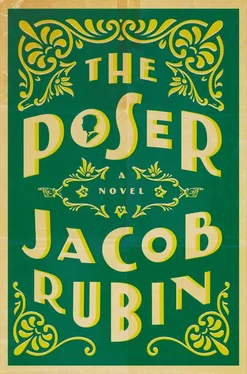“Oh? So he could be difficult?”
“Quite.”
“And… and was he that way with you?” I asked.
“Of course. I was his firstborn, Giovanni. The brilliant child. I once finished second in a grade-school chemistry competition. My father sat me down and said, ‘Josef, I know you could’ve gotten first but you’re scared to, so you chose second. But I’m telling you, it’s okay to come in first.’”
“He thought you’d done it on purpose?”
“Everything, Giovanni, was on purpose .”
“But why intentionally lose a chemistry prize?” I asked.
“He told me I was scared to surpass him. ‘The consequences of oedipal ambivalence,’ he called it. According to my father, I was overly modest, self-effacing. I could outdo him but was scared to.”
“Was it true?” I asked.
“Reasons are persuasive. If a child’s served them at a young age, he eats them up. Everything that happened in my childhood was that way. My mother received the worst of it. If she was late meeting us, she was trying to undermine him. If she forgot her keys, she was expressing hostility. Everything was a symbol. So, yes, I believed him. What’s worse, there was some truth to it. I was scared to outdo him.”
I smiled. “So did you start getting first place in your chemistry contests?”
“I did very well in school, yes, but it was complicated. The more my father egged me on — to be what he knew I could be — the more I took it to mean he thought I was secretly incapable, that I needed him to nudge me. He developed this exercise in which I would insult him.”
“Insult him?”
“After dinner every Sunday night, he and I would go into his dark, cluttered office, in the basement of our brownstone. He would lock the door and lie down on the chaise, where his patients went. I would sit in his chair, where he sat with his patients, and he would force me to insult him.”
“And you did?”
“Of course. I was young. Thirteen, fourteen. Too young to rebel. I wanted only his approval. Now to gain it, I had to insult him. I had no idea what to say.”
“What did you?”
“He fed me lines.”
“Fed them to you?” I asked.
The doctor smiled ironically. “Ah, childhood.”
“What were they?”
“‘Call me a fraud. Tell me I’m a small man with an overgrown reputation. You will dwarf me. You will outshine me. Say, “You are a shit, Father.”’”
“And did you?”
“I couldn’t disobey.”
“How did it feel, to do that?”
“At first I mumbled, and my father said, ‘Speak up, son. Scream it!’ He wanted it louder. Eventually, I did. Afterward, every Sunday, I went in my room and cried.”
“Did your mother know he was doing this?”
“My mother did whatever Father thought was best. If he believed something was important, she did, too.”
“Did you resent her for that?”
“Of course. In childhood one finds time to resent everybody. I don’t anymore. I understand. Part of the responsibility of any parent is to provide his child with something to resent. Or else there’s a kind of stagnation, an inertia, from generation to generation. Resentment is the language with which parents speak to their children.”
I smiled again. “Sounds like something your father might say.”
“My father was often right, Giovanni. That was the problem. Nothing, I don’t think, is so insidious as the truth. If he had been an abject brute, that would have presented its own challenges, its own traumas, yet it would have been easier, in the end, to rid myself of him. But he wasn’t. He was a brilliant and insightful man.”
“Who forced you to insult him,” I said.
“Worse than that, I’m afraid. By the time I turned seventeen, my father had all but anointed me his confidant. I was his first son, you see, and he interpreted this role with a kind of biblical intensity. He would take me into his office, lie down on the chaise, and confess. This, when I was eighteen. He worried my younger brother was too dull. That he no longer found my mother attractive. In many ways I became his psychiatrist, though in truth he orchestrated all that happened in that room. He divulged some very private things to me. Confessed that he’d cheated on my mother. With a patient, no less.”
“He told you this?”
“A Russian-Jewish girl, a nineteen-year-old. Her father, a renowned dental surgeon, had brought her in. She suffered from fainting spells, anxiety, and hysterical deafness. After a few months of analysis, though, my father was able to locate the source of her neurosis. The patient’s father, you see, had made it his habit to belittle and disparage her and did so terribly during crucial stages of her erotic development. As a result, she felt herself to be worthless. Social settings of any kind created such anxiety in her that she fainted or ‘went deaf.’ My father uncovered this all fairly quickly. Yet as any analyst knows, naming the problem is simple in comparison with treating it. It’s in treatment that true ingenuity is required. You may look at a patient — sit across from him day after day — knowing exactly what’s wrong with him, what it is precisely that troubles him. But that insight is meaningless if you don’t know how to provoke such insight in him.” He shifted in his chair. “As it happened, my father tried a number of things: hypnosis, word association, even some Gestalt methods, which he generally considered frivolous, but nothing reached the girl. It was around this time my father was experimenting with his New Method, the one I would eventually study. This New Method — it depended on the concept of transference. Have you heard the term?
“It’s a common, indeed inevitable, occurrence in psychoanalytic treatment. When a patient transfers a deep psychic attachment — one usually with the father or mother — onto the analyst. In most schools of thought this transference is considered a kind of spell, one that must be broken. The New Method, however, involved exploiting this spell, this transference, very explicitly, so that the doctor — well, let’s say, if the patient will inevitably transform the doctor into her father, the doctor, my father believed, must play the role of the father, must become the father the patient wished she had. A second, better father. Sometimes this meant he would act domineering, sometimes meek. The character the doctor played would depend on the patient.”
“And in this case the better father would sleep with his daughter?”
“My father believed the patient needed to perform the incest moment so as to free herself from its grip.”
“Did any of this work ?”
“Of course not. She became infatuated with my father. His refusal to sleep with her again she took as a confirmation of her worthlessness. Fun for the night, then in the trash. Daddy’s mistress, instead of Daddy’s bride. She had a series of hysterical episodes, even told people what my father had done, but no one, not even her own father, believed her word over Micah Orphels’s.”
“Your father admitted all of this to you?”
“He said, ‘I’ve made many mistakes and will make more. But it is all in the name of science, which is, by its nature, provisional.’”
“And how did you take it?” I asked.
“Since I was supposed to act as his analyst, I said, ‘Do you really believe sleeping with her was a scientific exercise?’ He said, ‘It gave me brief physical pleasure, sure. It catered to my ego, yes, but principally it was an experiment in treatment. A failed one, in this case, but I believe I have found a New Method. It needs to be implemented more carefully, but the future lies in transference.’”
Читать дальше












